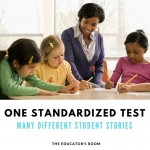This series is about using formative assessment in your classroom. Many teachers use this practice daily to know where students are and move them forward in learning. There are tools, however, that can strengthen the formative assessment you are doing in your classroom to meet the needs of all students you teach.
The first tool, discussed last week, is setting clear learning objectives. “We learn more by looking for the answer to a question and not finding it than we do from learning the answer itself,” Lloyd Alexander. Each teacher, classroom, district, state has objectives. Communicating your objectives clearly allows you to see the path students are taking on their learning and how each lesson connects. It allows you to use formative assessment as a tool to adjust and extend learning for all children in your classroom.
Coming from an early childhood background I found providing examples for students limited their creativity. Preschoolers will copy a project if it is place in front of them rather than tap their inner creativity and create. In elementary classrooms, however, it is important to provide examples of success criteria for our students. These models allow students to examine what their projects, writing, and work can strive towards. They provide a guideline for work rather than a sample to be copied. Success criteria provide an example of success for all students that will demonstrate how you know what they learned.
The first important thing about this tool in formative assessment it to consider all students success in your classroom. Each child has strengths and weaknesses, experience and vocabulary that they use to move along their learning path. Providing clear success criteria will allow all students to be successful in their task, while allow students to extend their learning when appropriate. For example, in our fourth grade classroom one of our objectives is for students to locate primary and secondary sources to provide supporting evidence for a research topic. When students are working on their projects they have a research grid to complete showing where their resources were found. The success criteria is to locate two relevant primary sources and then two secondary sources focused on one topic. Students can vary the primary source documents to meet their reading levels. My second grade readers (in a fourth grade curriculum) can find maps and photographs while my sixth grade readers (in a fourth grade curriculum) can find letters and diary entries. Each child is reading primary source documents relevant to a single topic, but they can be successful on their level. Formative assessments pushes students forward in their own learning.
Many teachers are already using success criteria in their classroom. Think about providing rubrics and writing samples. This area is often our strength in success criteria in classrooms. We have students use a rubric to peer edit, we look at writing samples together to discuss strengths and weaknesses of writers, and we provide examples of writing so students know how their final draft should appear. One teacher puts samples of writing on the wall for students to use as a walkable rubric. They can compare their writing (or peers’ writing) to the samples and walk the rubric to see where they fit. What a fun way for your kinesthetic learners to use success criteria to help them learn. A step into rubric that allows them to see strengths and weaknesses.
There are other simple ways you can, or may already, provide success criteria for students. Collect student work from past years that is exemplary (remove names) and discuss what makes this sample strong. Link the discussion with your objectives to discuss how it shows the learning. Create your own weak example and discuss the objectives that are not demonstrated and the learning that is not shown. Provide a checklist for students to use as they complete a project. Have exemplar samples as a reference. Discuss what makes a strong example of the learning so students are clear on what their focus should be. Providing success criteria for students allows them to see the target they are aiming for to show the learning that has occurred.
Formative assessment is the practice of using formal and informal assessment during learning to gather information then used to modify activities and improve student success. When tied to clear learning objectives and success criteria, teachers can have conversations with students while they are working and learning to guide them along their journey. How does your project reflect the items we discussed show learning? What are you missing? What more do you need to learn? What could you learn about next? Success criteria allows students to take charge of their work as they create and learn to show where they are along the path towards your classroom objectives.
Using success criteria as a tool in the process of formative assessment helps ensure students are learning. Each student should be engaged with the criteria in meaningful ways that support learning throughout the lesson, project, or unit. If you are using success criteria, how can you increase its effectiveness for all students? What do you need to do next? If you are not using success criteria where can you start? When used as a tool for formative assessment the majority of students will be engaged and benefit from the process.




